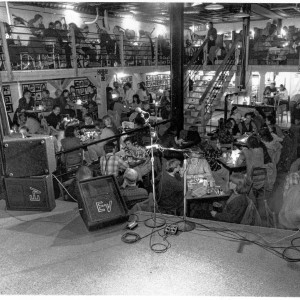Into the fire: Northampton author’s new book re-examines the 1993 siege in Waco, Texas, that left over 85 people dead
| Published: 01-21-2023 9:15 AM |
The images and the story, almost 30 years old, can still shock: a building compound on a Texas plain engulfed in flames following an FBI raid; girls as young as 14 and 15 with babies fathered by the messianic leader of a Christian sect; an initial gun battle between heavily armed sect members and federal law enforcement officers that left 10 people dead and numerous others wounded.
The 51-day siege in Waco, Texas in early 1993 between members of the Branch Davidians and the federal government remains a controversial event — and as Kevin Cook writes in his new book, the tragedy, in which 76 people (including over 20 children) perished in the fire that destroyed the Davidians’ compound, also became a launching point for many anti-government extremists.
In “Waco Rising,” Cook, of Northampton, has interviewed a number of Davidian survivors and other veterans, such as FBI negotiators, of the disaster, and he’s combed through many other records to provide a fast-paced account of how the Waco standoff unfolded.
It’s the most recent dive into notable past news stories for Cook, the author of 11 other books. His “The Burning Blue” from 2021 re-examined NASA’s Challenger space shuttle explosion in 1986, while 2014’s “Kitty Genovese” offered a fresh take on an infamous 1964 murder in New York City.
In “Waco Rising,” Cook provides a balanced look at the 1993 standoff. On one hand, he outlines a number of cases of government overreach and deceit during the siege, such as exaggerated reports that David Koresh, the Davidians’ leader, and other group members were abusing young children in the complex.
In another example, Cook says the FBI, in appealing to the brand-new U.S. Attorney General, Janet Reno, for the go-ahead to force the Davidians from their compound, exaggerated the threats posed by sect members, while withholding other information that suggested sect members might finally be ready to surrender.
But Cook also showcases the ongoing frustration FBI negotiators had in dealing with Koresh, a windy, self-proclaimed prophet who used his extensive knowledge of the Bible as a means to manipulate and control people. Koresh’s long monologues on scripture during telephone conversations with federal officials had some of them rolling their eyes at what they termed his “Bible babble.”
At one point, Koresh promised to lead his flock from the compound, known as Mount Carmel, if national radio would broadcast a sermon he recorded outlining his group’s beliefs. The broadcast duly took place, but Koresh then reneged on the deal, telling negotiators God had suddenly told him to sit tight and wait for further instructions. (Some children were released from the compound before its fiery end.)
Article continues after...
Yesterday's Most Read Articles
That frustration prompted the FBI to pull their patient lead negotiator, Gary Noesner — he’s a key source for Cook — off the case and bring in agents who wanted to play hardball and force the Davidians from their compound, in part because they said they feared a mass suicide event at the complex.
“There’s no use trying to talk to these bastards,” a new FBI supervisor, Dick Schwein, is quoted as saying. “We’ve got to just go in there and cut their balls off.”
Cook also presents a nuanced portrait of Koresh, offering some context by recounting his rough childhood. He was born Vernon Howell to a 14-year-old mother in Texas in 1959, abused by his stepfather, and he struggled in school, where his dyslexia landed him in special education classes.
A high school dropout, Koresh later memorized vast sections of the Bible and became convinced God spoke through him. He wasn’t your conventional holly roller: He played electric guitar and at one time dreamed of being a rock and roll star, loved tinkering with his cars and guns, and was by his own admission “addicted to sex.”
Though many Davidians described Koresh as a charismatic and inspirational leader, government agents saw him as the dictator of a brainwashed cult. He controlled all aspects of the day-to-day lives of the Davidians, an offshoot of the Seventh-Day Adventist Church, and he took many of his female followers, including married women and underage girls, as his multiple “wives.”
How it began
Following reports of Koresh’s liaisons with teenage girls and the stockpiling of possibly illegal weapons at the Davidians’ complex, the federal Bureau of Alcohol, Tobacco and Firearms secured a warrant to arrest Koresh in late February 1993.
On Feb. 28, armed ATF agents went to the compound. A furious gun battle erupted — Cook notes that both sides claimed the other opened fire first — and a few hours later four ATF agents and six Davidians were dead.
That set the stage for the prolonged siege, with the FBI taking over the scene after the ATF received widespread criticism for its actions. As Cook notes, the Feb. 28 shootout took place just six months after federal officials were slammed for causing civilian deaths in a standoff with extremists in Ruby Ridge, Idaho.
“Waco Rising” gives readers plenty of visceral details from the extended siege, where some 900 law enforcement personnel, from the federal, state, and county levels, set up camp. “Reporters felt the growing federal commitment through the soles of their shoes,” Cook writes. “The ground shook as Bradley and M1 Abrams tanks rumbled toward Mount Carmel.”
The horrific end came April 19, as armored vehicles breached the flimsy walls of Mount Carmel and pumped in clouds of tear gas. None of the Davidians initially surrendered, and Cook explores the controversy about how the deadly fires subsequently broke out at the compound. Government opponents claimed tear gas projectiles touched off the flames, but the feds insisted the Davidians started them to fulfill their apocalyptic vision of the world ending in fire.
What’s not in dispute, says Cook, is that Waco fueled the exponential growth in the U.S. of armed militias and anti-government extremists. As he sees it, one can trace a direct line from the siege to the Jan. 6, 2021 attack on the U.S. Capitol by Donald Trump supporters.
For starters, in April 1995 a disaffected former U.S. Army sergeant named Timothy McVeigh, who had supported the Davidians, blew up a federal building in Oklahoma City in retaliation, killing 168 people, including 19 children — the deadliest act of domestic terrorism in U.S. history.
On McVeigh’s heels, Cook notes, came an angry young Texan named Alex Jones, who used the Waco siege as the launching point for a lucrative career as a far-right talk show host and conspiracy theorist, one who has proclaimed the U.S. government part of a cabal of dark forces bent on crushing Americans’ liberty — and taking away their guns.
In the final reckoning, Cook writes, the Waco siege has become a symbol, a “dispute ready-made for the twenty-first century, one that turned not only on politics, religion, police power, and citizen’s rights, but on the very meaning of facts.”
Kevin Cook will discuss “Waco Rising” in a book launch at the Odyssey Bookshop in South Hadley on Jan. 31 at 7 p.m.
Steve Pfarrer can be reached at spfarrer@gazettenet.com.

 The Iron Horse rides again: The storied Northampton club will reopen at last, May 15
The Iron Horse rides again: The storied Northampton club will reopen at last, May 15 The power of poetry: U.S. Poet Laureate Ada Limón to speak at Smith College
The power of poetry: U.S. Poet Laureate Ada Limón to speak at Smith College Upon Nancy’s Floor: 33 Hawley event celebrates iconic dancers, history, and a new dance floor
Upon Nancy’s Floor: 33 Hawley event celebrates iconic dancers, history, and a new dance floor Embracing both new and old: Da Camera Singers celebrates 50 years in the best way they know how
Embracing both new and old: Da Camera Singers celebrates 50 years in the best way they know how
